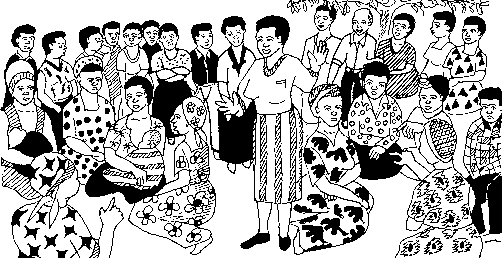Tweet
Translations:
'العربية / al-ʿarabīyah
Bahasa Indonesia
বাংলা / Baṅla
Català
中文 / Zhōngwén
English
Español
Filipino/Tagalog
Français
Galego
Ελληνικά / Elliniká
हिन्दी / hindī
Italiano
日本語 / Nihongo
Kiswahili
Polszczyzna
Português
Română
Русский
Српски / Srpski
Tiếng Việt
اردو / Urdu
Other formats:
Other Pages:
Modules
Site Map
Key Words
Contact
Utility Documents
Useful Links
TO BE A MOBILIZER
by Phil Bartle, PhD
Training Handout
Are you prepared to be an animator, facilitator, activist, or mobilizer?
Self Test:
Assess what skills and knowledge that you have. Ask:
- "Am I willing to give my time and interest to help community members to solve their problems themselves?"
- "Can I behave myself in such a way that the people will not see me as boasting?"
- "Can I work in the settlement while avoiding political and factional disputes?"
- "Can I keep up the interest of the people?"
- "Am I willing to work in such a way that they will say they did it themselves?"
- "Do I have enough elementary technical knowledge –in agriculture, appropriate technology, construction, disability, roads, nutrition, social work, soil conservation, hygiene, water– to assist community members to analyse their own problems?"
- "Am I willing to keep from being discouraged when many things go differently from the way I expected?"
The Role of the Mobilizer:
The role of the mobilizer is to mobilize a community to action leading to increased empowerment and self reliance.
Specifically, that entails the following:
Specifically, that entails the following:
- To call community meetings so as to:
- brief all members on correct information related to community self reliance; and
- organize and arrange the provision of all resources (human and materiel) needed for community actions;
- To stimulate community members to participate in their own community's desired development actions;
- To engage in activities that will promote increased community effectiveness, capacity, self reliance, and empowerment;
- To ensure that all information is accurate and correctly interpreted;
- To actively counteract incorrect information, especially that which causes unrealistic expectations, and later disappointment and discouragement;
- To encourage and praise community members, confirming that they have the ability to develop themselves;
- To ensure that every decision about what activities the community will undertake, is the choice of the whole community, not just a few (powerful) community leaders;
- To ensure that the vulnerable are heard in community decisions: including women, youth, disabled, ethnic minorities, the weak and disenfranchised;
- To promote and encourage unity in the community, unity of purpose, of goal and of action; actively counteracting forces of community disunity prejudice, bigotry, racism, sexism, clanism, patronage, caste, class;
- To come together frequently with other mobilizers to share experiences, mutually solve common problems, and to improve skills of social animation and community management;
- To assist in the learning of community management skills and techniques by community leaders and members.
The community mobilizer is a social animator, and should be knowledgeable about social animation principles and skills, seeking to learn more about how communities can be stimulated to unify, take their own decisions, plan actions, identify and provide their own resources for community action, and to choose appropriate strategies for using internal and external resources to reach common community goals. See: Mobilizer Job Description.
––»«––
A Mobilizer in Action:
 |